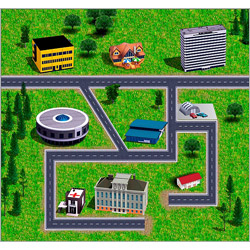
Executive Functions: Planning and Action Skills (PLAND) Module
Model 65321
In the PLAND training program, action and planning skills are trained through the presentation of realistic planning tasks.
Setting and Task
In the PLAND (Plan a Day) training program, the client is given the task of deciding on the best order in which to carry out the day's activities. The starting point is a list of things that need to be done and a virtual street plan on which various buildings and the client's current position are marked. In accordance with the planning task the client must devise a strategy for deciding the order in which the different components of the task will be tackled and hence the order in which the buildings will be visited.
Theory
Meaningful and independent action in everyday life becomes possible only when behavior is planned and organized over a relatively long period and competition between tasks is dealt with by setting priorities. Planning ability can be impaired by brain damage of any etiology and origin, especially where there is damage to frontal structures or diffuse cerebral damage. Executive functions can also be affected by a range of psychiatric illnesses, including schizophrenia and depression. PLAND is a training system based on everyday activities which enables clients to practice creating and implementing schedules of varying complexity. It gives the therapist the opportunity to work interactively with the patient to devise various strategies for improving cognitive functions and self-control. The aim is to improve planning and action skills in everyday situations.
Training Forms
The PLAND training program consists of three training forms (S1, S2 and S3) in which the task varies in accordance with three types of requirement: observing priorities, minimizing journey time and maximizing the number of tasks completed.
Difficulty Structure
The S1 training form has 19 difficulty levels; the S2 form has 16 and the S3 form 28. In all training forms the number of things that need to be done increases as the difficulty level rises. Depending on the training form, other difficulty parameters may be added as the difficulty level increases (e.g. increase in overlapping appointments).
